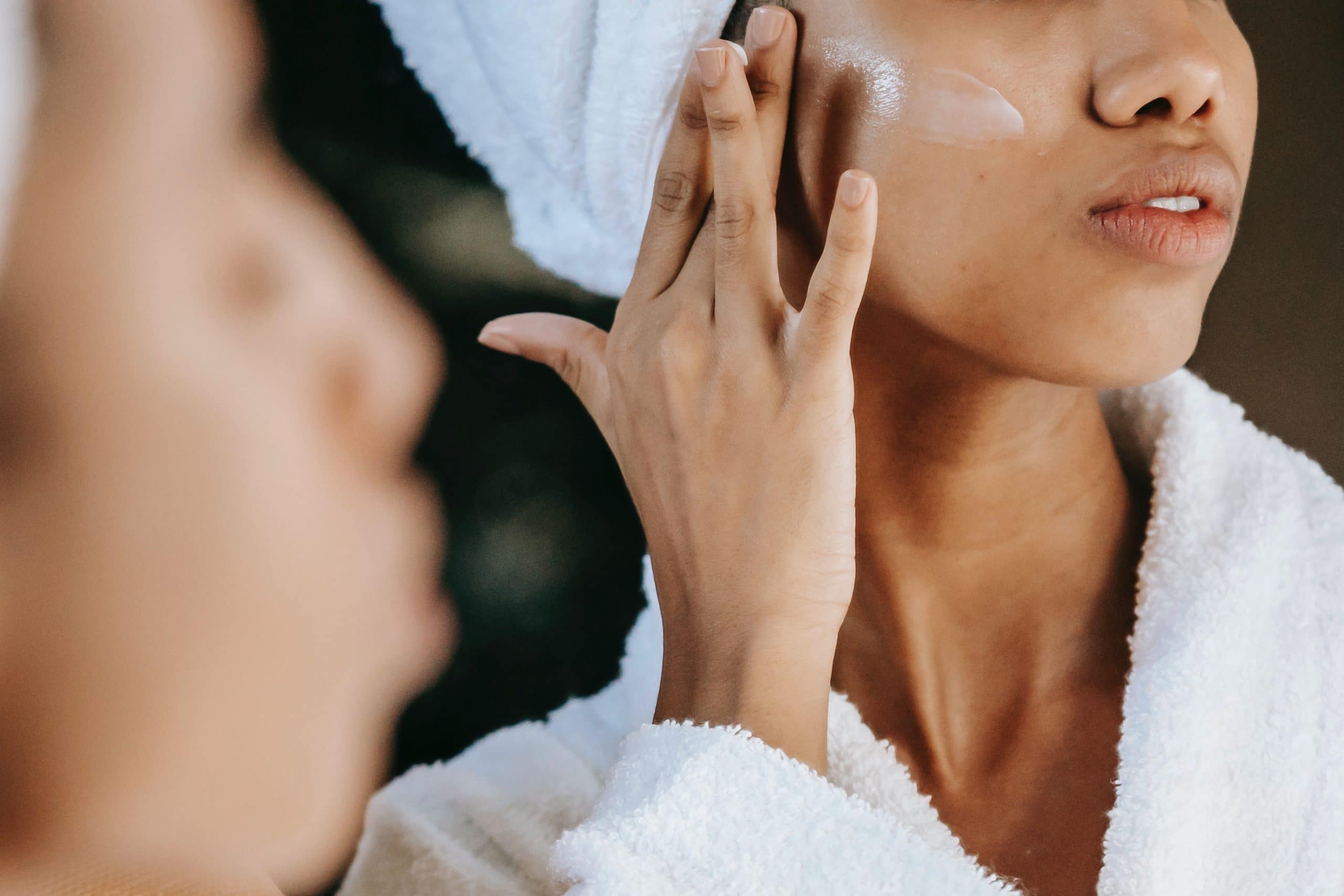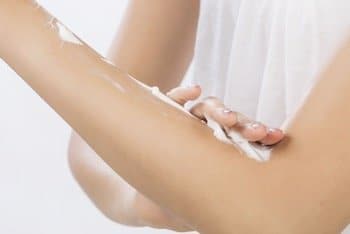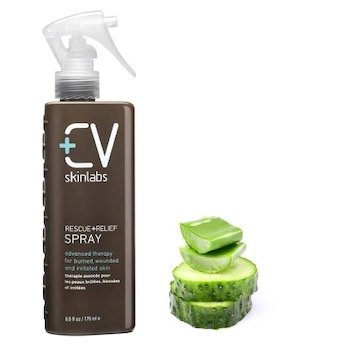
“Skin barrier repair.” You’ve heard this phrase tossed around in beauty circles, but you may have wondered about what it means, or how “skin barrier repair” can have anything to do with how your skin looks and feels.
At CV Skinlabs, we focused heavily on skin barrier repair when designing our formulas, because we understood then how important it is to the health of the skin. Today, it’s even more important than ever to make sure your skin barrier is in good shape.
What is the Skin Barrier?
The very outermost layer of skin provides a barrier between you and the outside world. Also called the “epidermis,” this layer is composed of skin cells, lipids (fats), and natural moisturizing factors that when working optimally, keep out invaders like bacteria, viruses, fungi, and pollution, while keeping in the good stuff like moisture and nutrients.
When trying to picture the skin barrier, you can visualize a brick wall, as that’s sort of what it’s like. The cells are the bricks and the lipids or fats are the mortar that holds the bricks together. Together, they form a wall that protects you from environmental assaults.
Underneath the outer layer sit two other main layers of skin. In sum, the skin is made up of three layers:
- Epidermis: This is the outer layer, the skin barrier, that helps protect you from contaminants.
- Dermis: This is the second layer underneath the epidermis. It houses the blood vessels, sweat glands, nerves, and the proteins that give skin its firmness and bounce (collagen and elastin).
- Subcutaneous: This is the third layer that sits underneath the dermis. It is made up primarily of fat, which provides a cushion between the skin and the muscles and organs underneath.
What Does the Skin Barrier Do?
The skin barrier has a very important job: keeping you healthy! Without a strong skin barrier, harmful environmental toxins, bacteria, and other microbes could penetrate your body, harming not only your skin but your overall health as well.
At the same time that it’s keeping harmful contaminants out of your body, a healthy skin barrier also keeps moisture and natural oils in. Without it, the moisture in your skin and body would evaporate, leaving you dried out and dehydrated.
Symptoms of Skin Barrier Damage
In an ideal world, we’d all be running around with perfectly healthy skin barriers. We’d have healthy, strong bodies and glowing, soft skin.
Unfortunately, most of us have some sort of skin barrier damage. You can tell that your skin barrier is struggling by looking for symptoms like these:
- Redness
- Dryness
- Flakiness and peeling
- Inflammation
- Dehydration
- Tightness
- Sensitivity
- Itchiness
- Rough skin texture
- Acne flare-ups
 What Causes Skin Barrier Damage?
What Causes Skin Barrier Damage?
When the skin barrier is damaged, the “mortar” between the bricks develops cracks and gaps. Once that happens, it’s harder for the skin to do its job. It can no longer keep out irritants and germs, nor can it prevent water loss as well as it did before.
Several factors can contribute to skin barrier damage:
- Age: As we get older and the skin suffers more wear and tear, the barrier is more likely to suffer some damage.
- Aggressive skincare: Using harsh cleansers, exfoliating agents, and aggressive peels too often can harm rather than help the skin barrier, damaging the healthy cells and causing microtears in the skin. Skincare products that are formulated with harsh ingredients, such as drying alcohol, synthetic fragrances, sulfates, or harsh essential oils, can strip the skin of its nutrients, damaging the skin barrier. Using too many products can do the same.
- Detergents and soaps: Whatever touches your skin affects it. Detergents and soaps that you use every day may be damaging your skin if they are too harsh or if they are not properly pH-balanced.
- Environmental assaults: Excessive exposure to the sun (UV rays), high levels of pollution, harsh weather (cold air and wind), dry indoor air (created by air-conditioning or heat), and other environmental factors can damage the skin barrier over time.
- Genetics: Some people have health conditions that weaken the skin barrier. Eczema is one of the most common of these. Psoriasis and rosacea are two other common ones.
- Stress: Scientists have discovered a powerful connection between stress and damaged skin. When you’re stressed, the body releases hormones that can damage this important outer layer. In a 2018 study, researchers found that psychological stress had clear and observable negative effects on the skin barrier, whereas relieving that stress improved barrier function.
Steps to Skin Barrier Repair
If you’re noticing signs of a damaged skin barrier, it’s time to take action. The following steps can help you repair the damage and bring skin back to its healthy, glowing self.
1. Simplify Your Skincare Routine
Go back to the basics of cleansing, toning, and moisturizing. Ditch all the other steps for now and give your skin a break.
 2. Use Only Gentle, Nourishing Products
2. Use Only Gentle, Nourishing Products
Take a good hard look at the skincare products you’re using. Get rid of products with astringents like alcohol and witch hazel. Avoid foaming cleansers and choose cream-based ones instead. Ditch the formulas with petrolatum, sulfates, and silicones, and choose instead only formulas that have good-for-your-skin ingredients. Some to look for: glycerin, hyaluronic acid, oils rich in fatty acids (olive, jojoba, rosehip seed, sunflower, etc.), ceramides (which are lipids), and antioxidants (vitamins C, E, B3, turmeric, others).
Our CV Skinlabs products are all made to help heal the skin barrier:
- Rescue + Relief Spray: Replace your alcohol toner with this gentle toning and renewing spray. It helps soothe the itching, burning, and irritation that comes with a damaged skin barrier, while imparting instant moisture to hydrate and cool.
- Moisturizers: Our Calming Moisture and Body Repair Lotion are both formulated with powerful anti-inflammatories that address skin barrier damage and help heal. Ideal for soothing skin irritated from aggressive skincare, sun exposure, and environmental assaults.
- Restorative Skin Balm: Meant to address skin that is dry and flaking, chapped, and rough, this healing balm provides extra TLC to those areas where the skin barrier has been compromised.
3. Avoid the Scrubs
Physical exfoliation—the type that uses small beads, nuts, and other harsh ingredients to slough off dead skin cells—can make skin barrier damage worse. Be extra gentle for 2-4 weeks at least, and when you go back to exfoliating, use a gentler formula employing fruit acids.
4. Add-In a Barrier-Healing Serum
After your skin has calmed down a little, it’s time to add in a repairing serum before your moisturizer. Look for one that contains hyaluronic acid, niacinamide, and/or ceramides, as these ingredients nourish skin, replace lost moisture, and help protect the skin from further damage.
CV Skinlabs moisturizers can act as barrier-healing serums. Simply use them as usual to notice a gradual improvement in skin barrier health.
5. Protect Your Skin
As your skin starts to heal, you must protect it. Use a safe sunscreen (zinc oxide or titanium dioxide) every day, use scarves and gloves against harsh weather, and always wash your skin well at night before bed. If you don’t, all the microbes that you were exposed to during the day will remain on the skin all night long, wreaking their damage.
How Long Does Skin Barrier Repair Take?
If you follow all the steps above, you should see results within 2-4 weeks. Your skin should start to feel more comfortable and retain moisture better than it did before, and symptoms like dryness, flaking, redness, and irritation should subside.
If you’re not seeing improvement, check your products again to be sure they have the ingredients you need to heal. Then continue with your simplified routine. If you’re consistent with it, you will notice improvements.
Have you noticed that you need skin barrier repair?
Featured photo by Sora Shimazaki from Pexels.
Sources
Choe, S. J., Kim, D., Kim, E. J., Ahn, J., Choi, E., Son, E. D., Lee, T. R., & Choi, E. H. (2018). Psychological stress deteriorates skin barrier function by activating 11β-Hydroxysteroid Dehydrogenase 1 and the HPA Axis. Scientific Reports, 8(1). https://doi.org/10.1038/s41598-018-24653-z
Steptoe, A., Gibson, E. L., Vuononvirta, R., Williams, E. D., Hamer, M., Rycroft, J. A., Erusalimsky, J. D., & Wardle, J. (2006). The effects of tea on psychophysiological stress responsivity and post-stress recovery: A randomised double-blind trial. Psychopharmacology, 190(1), 91-91. https://doi.org/10.1007/s00213-006-0620-z

